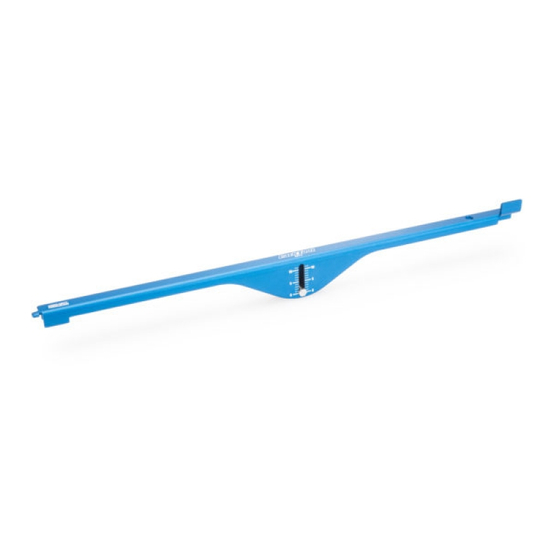
Publicité
Liens rapides
Park Tool Co.
5115 Hadley Ave. N., St. Paul, MN 55128 (USA) www.parktool.com
BDT-2 Belt Drive Tension and Alignment Tool
The BDT-2 is a gauge designed to help set the proper tension on most
belt drive systems and sizes. The BDT-2 also gauges rear cog parallelism
and angularity.
MEASURING TENSION:
1. Place BDT-2 on belt making sure that the entire length of the BDT-2
tool will contact the belt. In order to get an accurate tension reading
it is critical that the tool contacts only the belt and does not contact
something like a cog or pant guard as this will prevent an accurate
tension reading!
2. Push down on the BDT-2 until both the front and rear of the tool make
full contact with the belt.
3. Read the gauge. The tension of the belt can be determined by compar-
ing the center line of the indicator to the scale.
4. If the indicator becomes stuck and does not return to zero, manually
re-center the spring and repeat steps 1-3.
SUGGESTED TENSION RANGE:
Continental: 6–9
Gates: For single speed urban and mountain bikes, the tension should be
set between 8 and 10, with 8 reflecting a lower typical tension. For bikes
with internal geared hubs, contact Gates.
(www.gatescarbondrive.com/tech/overview)
When in doubt please consult with the bike and/or belt manufacturer for
precise belt tension specifications.
BDT-2 Belt Drive Tension
and Alignment Tool
9
MEASURING PARALLELISM AND ANGULARITY ALIGNMENT:
1. Turn the tool over with the tension gauge facing up and away from
the belt.
2. Place locating tab against top and outside edge of rear cog while apply-
ing constant and firm pressure.
3. Outside edge of the front cog
should fall within the width of
the alignment indicator. If the
outside edge of the front cog
does NOT fall within the width
of the alignment indicator then
the front and rear cogs are not
within specifications and must
be adjusted.
Publicité

Sommaire des Matières pour Park Tool BDT-2
- Page 1 2. Push down on the BDT-2 until both the front and rear of the tool make full contact with the belt. 3. Read the gauge. The tension of the belt can be determined by compar- ing the center line of the indicator to the scale.
- Page 2 Ausrichtungsanzeige fallen. Ist dies nicht der Fall, sind vorderes und hinteres Zahnrad nicht innerhalb der Spezifikationen und müssen 2236 Spring Retaining Screw angepasst werden. © 2016 Park Tool Co. PARK TOOL® and the color BLUE are registered trademarks of Park Tool Co. 7/16...
